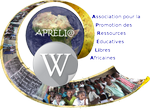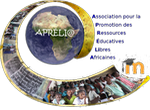Chapter 5 : Celebrations in our Partners’ country
 The Apréli@ Network
The Apréli@ Network
Educative e-Twinnings
Chapter 5 : Celebrations in our Partners’ country
Back to Travel Diary Mod : Who is who Ch 1 Ch 2 Ch 3 Ch 4 Ch 5 Ch 6 Ch 7
Notes:
-
Before you start working with classes, use this guidance sheet as a basis to finalise the work instructions and schedules in cooperation with your colleague partner. Make sure you record your decisions.
-
At the bottom of the website screen you will find different versions of the chapter: the pdf version allows you to print without making any changes, the doc or odt versions allow you make the changes you wish to make, and then print if you want to do so.
-
All exchanges of documents between partners are done by email or by using a shared virtual space, such as Dropbox (https://www.dropbox.com/).
The class will get to know and present the festivals and celebrations in their partners’ school, district, village, town, regions and country.
At the end of this chapter, both classes will:
-
prepare an electronic document in the shape of a calendar and of information sheets on the Celebration in the partners; country.
-
prepare a Calendar of celebrations in the partners’ country to display in their classroom.
To complete this chapter, pupils will use the approach described below to collect information on the family, popular, secular, religious, local, regional, national celebrations in their partners’ country.
This will allow them to discover their partners’ customs and traditions.
The recommended resources at the end of this chapter provide support for teachers on alternative ways of presenting this topic.
-
Overall Objectives
-
Raise children’s awareness to others’ customs and traditions
-
Establish links between celebrations and their family, popular, religious, local, regional or national origins
-
-
Specific Objectives
Pupils will be able to:
-
discover their partners’ celebrations and compare them with their own
-
discover the links between celebrations, family and social lifestyle, history and culture
-
strengthen the knowledge acquired in other school subjects, such as history, geography, English, music education and the arts
-
-
Local objectives (to integrate the work on this chapter to the school curriculum)
-
relevant school subjects
-
teaching and learning objectives
-
-
Information technology objectives
-
To look for information on celebrations on the Internet
-
To handle a table using a word processing package or a spreadsheet
-
1. Preparation
-
Each class asks the partner class to provide a list of key family, popular, secular, religious, local, regional and national celebrations.
-
Each teacher organises a brainstorming session for the class to establish and agree together the list of questions on festivals and celebrations the class wishes to ask. Questions may include: What festivals are celebrated throughout the country / nationally? What holidays are celebrated locally? What holidays are celebrated in families? What are their characteristics? Etc.
2. Working on answers
-
To prepare the response to the partner class’s request, each teacher organises a survey for the class to establish the list together (See the TESSA Resource on conducting a survey in the section: Ways to explore who pupils are (Select the Resources Tab, and then select Resource 3). And then the class works in groups to provide the answers requested on the celebrations.
-
The class sends its answers to the partner class.
-
While waiting for the partner class’s response, each class designs a celebration information pro-forma on what it would be helpful to know on celebrations to present them in the best way (e.g., date, type of celebration, what happens during the celebration, etc.) - a kind of celebration ID sheet, which can be filled in for all celebrations.
3. Requesting more information
-
Each class selects a maximum of 10 celebrations.
-
The class is divided into groups (one per celebration). For the organisation of group work, see the TESSA key resources Using group work in your classroom.
-
Each group lists the information needed on the celebration information pro-forma that the class previously established. If information is missing, the class then sends a request for the missing information to the partner class.
Example: What is the precise meaning of the "Independence Day Celebration"? When does it take place? What happens then? Are children involved? How do you celebrate Independence Day with your family? Etc.
4. Providing more details
-
On receiving the questions from its partners, the class is divided into groups, each group taking responsibility for answering questions about one or more elements.
-
The answers to queries are sent to partners.
5. Preparing the Digital Travel Diary chapter for publication
-
Each group fills the calendar page, a celebration information pro-forma and write a text for the party for which it is responsible. The group (or some delegated members) look for a picture on the Internet and then keys in and saves the text and the corresponding picture.
-
All the documents are sent to partners.
6. Validating the Digital Travel Diary chapter for publication
-
The partner class looks at the calendar and at the texts on celebrations in their country, region, and families. They may suggest additions or changes (if necessary) before returning the documents to their partner class.
7. On receiving corrections and modifications
-
Pupils complete the calendar and the celebration information pro-formas and place them in the shared virtual space.
-
They select pages from the calendar for their classroom, print and display them.
The final products are available:
-
in the web space, Chapter 5 of the Digital Travel Diary, Celebrations in our partners’ country in the form of a well written and well presented calendar and celebration information pro-formas.
-
Pupils prepare a slideshow presenting different celebrations, incorporating audio and video documents for other classes, parents, and school partners.
-
During history lessons, pupils prepare a presentation on African independence, after the teacher has outlined some general indications in class. Resources for the teacher, from the TESSA OER:
-
Investigating how we used to live and the linked resources
- Resource 3: Ugandan independence
- Resource 4: The exile of Ugandan Asians – a news report in 1972
-
Understanding timelines and the:
-
Resource 1: Some important historical events since independence
-
Resource 2: The rise and fall of Idi Amin
-
Resource 3: African timelines template
-
Resource 4: Key events in the move to independence
-
-
The teacher and pupils review the objectives set for this chapter, decide whether these have been achieved and how they know it.
-
They consider what they have learned while completing this chapter, and how they can demonstrate what they have learned.
-
A computer with an Internet connection
-
A word processing package
-
A spreadsheet package
-
A presentation software package (optional).
-
For more support on using the theme of celebrations in the classroom, see the TESSA resource Celebrations which complements work on Ways to promote wellbeing. Click on the resources tab and then select Resource 1 and for ideas of illustrations you could add call upon, Resource 2.
-
Apréli@ e-twinning Chapter 5: Celebrations in our partners’ country
From the TESSA OER:
-
Key Resource: Using Mind Maps and Brainstorming to Explore Ideas
-
How to conduct a class survey: Life skills, Module 1, Section 1, Resource 3 How to conduct a class survey http://www.tessafrica.net/node/633
Click on Resources tab and then select Resource 3
-
Key Resource: Using group work in your classroom
http://www.tessafrica.net/files/tessafrica/kr_groupwork.pdf -
Investigating how we used to live: http://www.tessafrica.net/node/716
Click on the Resources Tab (http://www.tessafrica.net/node/716) for
-
Resource 3: Ugandan independence
-
Resource 4: The exile of Ugandan Asians – a news report in 1972
- Understanding timelines and the linked resources: http://www.tessafrica.net/node/718
Click on the Resources Tab (http://www.tessafrica.net/node/718) for:
-
Resource 1: Some important historical events since independence
-
Resource 2: The rise and fall of Idi Amin
-
Resource 3: African timelines template
-
Resource 4: Key events in the move to independence
-
Celebrations: http://www.tessafrica.net/node/637 (Resources 1)
-
Ways to promote spiritual wellbeing: http://www.tessafrica.net/node/637
Back to Travel Diary Mod : Who is who Ch 1 Ch 2 Ch 3 Ch 4 Ch 5 Ch 6 Ch 7 To the top
| Home-page | The Teacher Educator's Resources (in French) |
TESSA pedagogical support | IFADEM computer literacy (in French) |
Educational resources of e-twinning @ Apréli are under Creative Commons license level 5:
paternity, not commercial use, sharing the same initial conditions
(See http://creativecommons.org/licenses/by-nc-sa/2.0/fr/)

